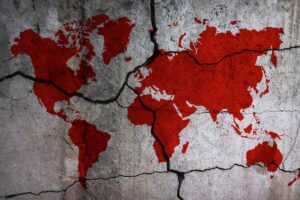The Red cell project
The Red Cell was a small unit created by the CIA after 9/11 to ensure the analytic failure of missing the attacks would never be repeated. It produced short briefs intended to spur out-of-the-box thinking on flawed assumptions and misperceptions about the world, encouraging alternative policy thinking. At another pivotal time of increasing uncertainty, this project is intended as an open-source version, using a similar format to question outmoded mental maps and “strategic empathy” to discern the motives and constraints of other global actors, enhancing the possibility of more effective strategies.
Is the United States inadvertently rejecting a strategic advantage in its competition with China?
The current immigration policy debate in the U.S. centers around how to limit immigration, with positions ranging from extreme restrictions and expulsions to calls to cap the current numbers of people coming into the country. Beyond the moral implications, such policies are shortsighted and 180 degrees wrong from economic prosperity and national security perspectives.
The United States’ restrictive immigration policies undermine U.S. competitive strategy toward China because it weakens the U.S. economy and damages Washington’s global influence. Instead, the United States should significantly increase immigration as a central element of a national security strategy that maximizes America’s strength as a growing, dynamic, open, and diverse society, admired and widely engaged with the world, relative to China as a demographically stagnant, closed, and largely homogenous society. In competing with China, a more expansive and open immigration policy is a potentially major area of comparative advantage for the U.S.
Washington should embrace increased well-structured legal immigration as a central element of policies to stimulate long-term economic growth and thereby build national power to compete with China. During the next several decades, America’s economic growth — the basis of national security — requires more workers. China, Japan, and much of Europe face long-term economic stagnation because of their declining populations. The birth rates of earlier waves of immigrants to the U.S. are declining, thus the main source of new workers is immigration. The importance of immigration to creating a growing, dynamic economy and society was sometimes recognized by past U.S. governments, e.g., those of the late 19th and 20th centuries. In contrast, during much of the last couple of decades, the U.S. has been harming economic growth by seeking to limit immigration (albeit sometimes unsuccessfully). In addition, efforts to restrict tech-worker visas (e.g., H-1B)1The H1-B visa is a non-immigrant visa that allows U.S. employers to temporarily employ foreign workers in specialty populations. Wikipedia. to stimulate local hiring, end up limiting innovation and growth, including causing companies to locate outside the United States
Need for Tech Workers . . .
Developing advanced technologies, including new technologies, will be a key foundation of competition with China and U.S. national security in the coming decades. To strengthen U.S. technology leadership, the U.S. should expand, not contract its welcome to large numbers of scientists, researchers, technicians, and students from around the world and offer them a home to pursue their work. Indicative of the importance of foreign STEM graduates, between 2000 and 2015, roughly 178,000 non-U.S. personnel received STEM PhDs in the United States, or just over 40% of the total. Typically, about three-quarters remain in the United States for at least several years, with many becoming citizens, including, for example, half of those who graduated between 2000 and 2004. In fact, many of the cutting-edge Silicon Valley tech firms that play a key role in U.S. prosperity are led by immigrants. The U.S. should welcome them as equal, trusted partners in society, to further develop the United States’ open and collaborative technology ecosystem, a secret sauce of techno-economic leadership.
In contrast, China — with little immigration — restricts free intellectual exchange and lacks global appeal (although it compensates with heavy investment and technology theft). Rather than imitate China and close U.S. society and the economy to compete, the United States should double down on its comparative advantage of a free, open globally integrated society and encourage increased immigration of highly skilled workers from around the world.
. . . And Other Types of Workers
Many people, including some anti-immigration hardliners, might agree with the desirability of encouraging people with high-tech skills to immigrate to the U.S., but not everyone recognizes the equally critical need to attract other types of workers. For example, the U.S. agricultural and construction sectors are heavily dependent on people from other countries. The U.S. economy would crash in their absence. In addition, immigrants provide a vast array of other essential services throughout the United States that contribute to the economy, in many cases performing tasks that descendants from earlier generations of immigrants do not want to perform. (U.S. society owes a vast debt to immigrants who preserved daily life during the COVID-19 pandemic.)
Perhaps more important in the long term is that these “low-tech” workers all seek to improve themselves economically and socially, via hard work and education. This multiyear process of socio-economic advancement is a critical, but often hidden, engine of long-term economic growth necessary for competing with China. As immigrants improve their lives, all of society benefits. Consequently, the U.S. should also welcome more “low-tech” immigrants and provide the social support necessary for them to integrate into U.S. society. Actions to perpetuate a permanent underclass of immigrants or discriminate based on race, ethnicity, or national origin undermine national economic growth and harm domestic stability.
Prosperity for an Aging America
Absent increased immigration, the US population will continue to age, which in turn will further slow economic growth, reduce the United States’ capability to compete with China and harm national security. The portion of the population of working age will decline, while the portion of society using healthcare and social services will increase. More national resources will be diverted to support an aging population rather than for high-tech advancement, economic growth, and defense spending, reducing U.S. capabilities relative to those of China. Only by accelerating economic growth, which requires more people (including providing health and social care for the aged), can the growing cost of an aging population be accommodated while still leaving adequate resources to compete with China. China is facing more serious demographic pressures: China’s working age population is expected to decline by a quarter over the next two to three decades. In the absence of a large infusion of immigrants, the country faces potential economic and social stagnation.
Global Appeal
U.S. global leadership is based on a variety of factors beyond economic and military power, including so-called “soft power” and the diplomatic influence that accrues to the United States because of its appeal. A key factor in that appeal for much of U.S. history has been immigration, especially the United States’ willingness to accept tens of millions of people from around the world and ultimately integrate them into a new society.2 Such efforts at integration have not all been positive. Far from it. This negative record includes slavery, Jim Crow, the devastating impact on Native Americans, and persistent bigotry against various groups. Increasing immigration, primarily from the Global South, is a way to build America’s global appeal and strengthen ties between American society and the societies of the origin countries. Although encouraging immigration may not translate into short-term diplomatic gains for Washington, this is a way to build broader and enduring ties between peoples and societies, which are important in long-term competition with China. Importantly, it’s an area of considerable potential advantage for the U.S. over China which has chosen to not build such societal relations.
Growing Global Migration
The increased movement of people across the world during the last several decades is an essential element of global and American prosperity. As was evidenced during the COVID-19 lockdowns/liftings and ensuing recessions/recoveries, such movement is now baked into the global system. To maximize economic growth the U.S. (and other countries) should encourage global migration. Moreover, this freer system would favor open societies like the US, relative to closed, walled-off societies like China. Former UK Home Secretary Suella Braverman, speaking at the Conservative Party Conference, recently uttered a truth about the world today and tomorrow, even if it was a hyperbolic exaggeration (laced with bigotry), “Because today, the option of moving from a poorer country to a richer one is not just a dream for billions of people. It’s an entirely realistic prospect.” Later she noted that “unprecedented” mass migration was “one of the most powerful forces reshaping our world.” “The winds of change that carried my own parents across the globe in the 20th century was a mere gust compared to the hurricane that is coming,” Braverman said. Although she thought this was bad, it is instead a beneficial part of today’s world and one the U.S. has the potential to leverage.
The large-scale movement of people around the world is a feature, not a downside, of the world today. It is a positive phenomenon deeply interwoven with growing global prosperity, expanding international interactions, improving advanced technology, and broadening sociocultural perceptions and attitudes. Harsh crackdowns, walls, and mass deportations have failed to stem the flow. They are only likely to significantly restrict migration to the extent that economic prosperity is harmed, and basic civil and human rights are abandoned, as Braverman in effect called for in the same speech. She said: “Our country (the UK) has become enmeshed in a dense net of international rules that were designed for another era. And it is Labour that turbocharged their impact by passing the misnamed Human Rights Act. I’m surprised they didn’t call it the ‘Criminal Rights Act’.”
The United States can adopt the UK’s “little-England” model driven by fear and bigotry and build walls and initiate mass roundups and deportations, as some US politicians have advocated, including lamenting the inability to shoot migrants. At the same time, the U.S. would be accepting the associated reduction of basic rights and liberties. Beyond the devasting economic impact, such measures would poison popular attitudes and Washington’s commitment to be an open, diverse, and vibrant society. Policies to effectively reverse the large-scale movement of people will fail unless such movement no longer becomes a desirable option, leading to a race to the bottom to make conditions unappealing with consequences for current citizens. The U.S. and other migrant destinations should not mimic China or North Korea just to control the movement of people.
During the coming decades, the movement of large numbers of people will increase, driven by population growth and climate change. The world’s population reached eight billion in 2023 and is on track to reach 10 billion in a couple of decades. Most of that growth will occur in the Global South, so in the absence of better governance and socio-economic conditions, large numbers of people will seek to move. At the same time, the world is failing to meet the Paris climate treaty goals; thus the consequences of climate change will intensify, forcing millions to move to survive. As a result, the world will experience large-scale migration. Efforts to wall off the United States (and other developed areas like Europe) will fail in the face of such momentum and cause socioeconomic decline for the US and Europe and increase violent instability in the Global South. The U.S. and other wealthy countries are already being forced to respond to this population movement. This can be done smartly and legally, by accepting and managing the movement in concert with increased aid and investment to benefit global prosperity, governance, and stability — or it can be resisted with increased violence, repression, and instability.
The Bottom Line
The United States should embrace the increased movement of people as an integral and beneficial fact of the world today, lead the international community in developing a coherent, legal, and humane management plan, and leverage U.S. history as a diverse society to benefit the U.S. economy and society writ large. As a result, the US could restore its reputation, become an appealing focal point for people around the world, and gain significant soft power. Migration is a major part of the world today, and it is an area where China is a non-player. The United States has a notable potential edge in this area over China. Washington should exploit it.
Harry I. Hannah is a retired Central Intelligence Agency officer. During his 34 years in the intelligence community, he worked on a variety of intelligence issues, including with the CIA’s Red Cell. CIA approval of the publication of this brief does not represent endorsement or verification of this work. The author’s affiliation with The MITRE Corporation is not intended to convey or imply MITRE’s concurrence with, or support for, the positions, opinions, or viewpoints expressed by the author.
Notes
- 1The H1-B visa is a non-immigrant visa that allows U.S. employers to temporarily employ foreign workers in specialty populations. Wikipedia.
- 2Such efforts at integration have not all been positive. Far from it. This negative record includes slavery, Jim Crow, the devastating impact on Native Americans, and persistent bigotry against various groups.




